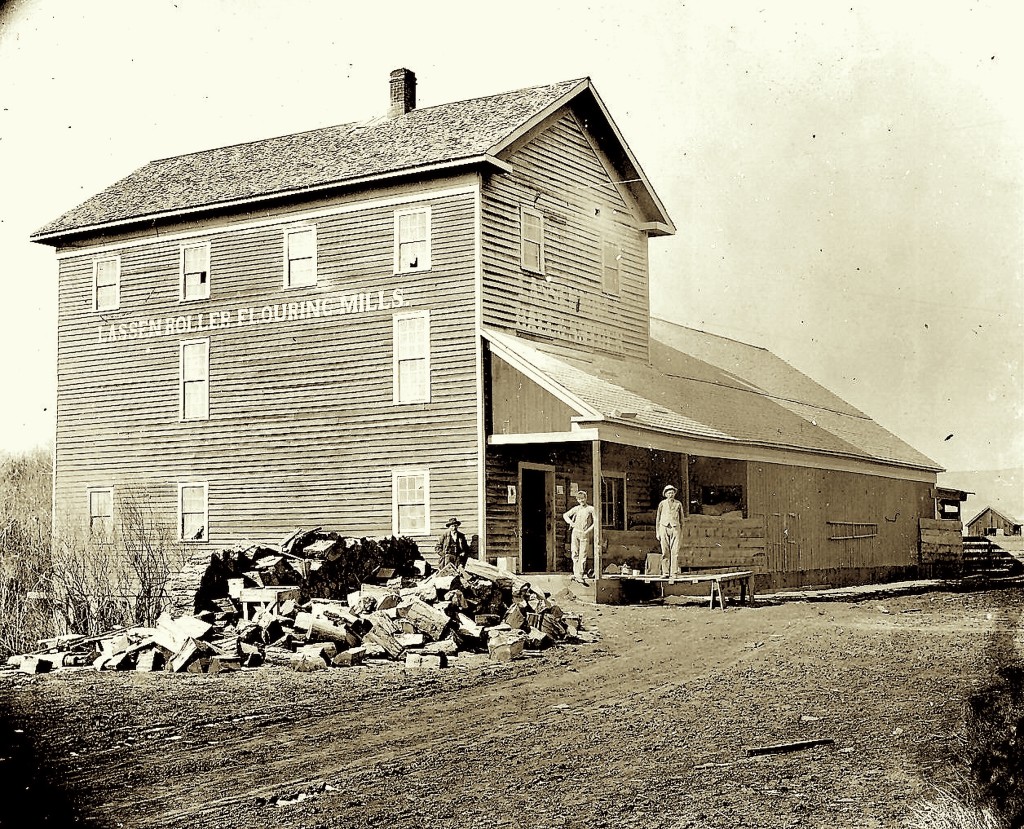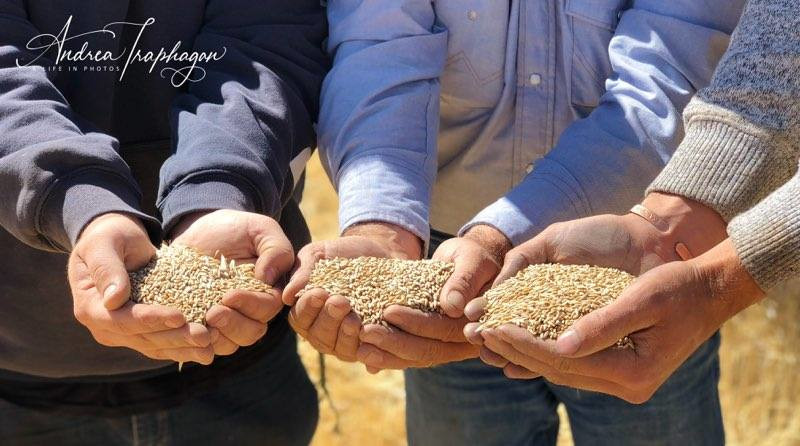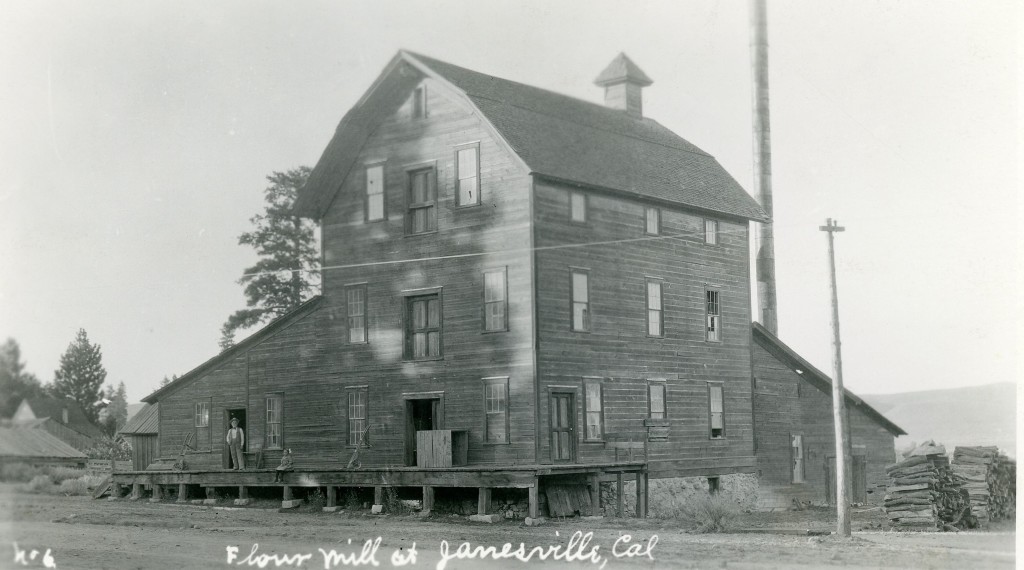Image courtesy of Mr. Tim Purdy
California has a vast history of riches in the northern part of the state—from the gold pulled from the mountain streams to the flaxen gold of the grains farmed in the field. Most came to win their gold one way or the other in the north state. With the migration of these prospectors the duty fell to the farmers in providing food for the settling of the northern counties like Lassen County. Wheat was the standard staple to survive the winters of the northeastern part of the state and it was imperative for survival to be successful in the growing of cereal grains. The raising of the golden grains in Lassen County’s fertile soils was done by dedicated farmers marking out a piece of land in the new territory. Milling this life sustaining commodity into flour was an important factor to settling an area cutoff from the state in the winter months.
In Lassen County Peter Lassen knew that sustaining the settlers in a harsh winter environment would prove needful. He was instrumental in setting up one of 4 mills in the county. Lassen’s first formal mill was located in Milford CA in 1862 and in 1882 it was followed by the Honey Lake Flour Mill in Janesville CA. Changing ownership in 1885 brought a new name and thus the Janesville Flour Mill was born. In 1896 newspaper articles from Sierra Valley a town north of Lassen County shared descriptive stories of teams of wagons that would pick up loads in excess of 18,000 pounds of flour to haul them over snowy passes to Camptonville and Downieville in Yuba County. In the late 1890’s Lassen County was a leading producer of the golden cereal grains that these mills would change to life sustaining flour for the small towns surrounding the valley.

The Lassen Flouring Mill, 1901. Courtesy of the A.J. Mathews family.
It was during this time period that Lassen Roller Flour Mill was also running in Johnstonville, another small town in Lassen County. Built shortly after the Milford Flour Mill the Lassen Flouring Mill serviced the area to the south of Susanville CA. Not much is written about and or found in newspaper articles of the day to speak of the production but it is noted that Janesville and Johnsonville were the mills the grain growers supplied in Lassen county. When Lassen Flouring Mill closed its doors in 1908 the load fell on Janesville to be the only facility milling of the local area grain market. With all the grain business falling to Janesville it was still reported this Mill only ran during the harvest season.
The year was 1898 and Joseph Gehring a new owner of the Janesville Mill was still providing the grain growers in the area a place to sell their crops. In addition to the local area usage of flour Gehring ventured to the Sacramento Valley to market Lassen County’s flour to the sophisticated palates in the Sacramento basin . In valley advertisements Gehring is quoted to boast the wheat from Lassen county would rival the Sacramento Valley producers. It is assumed he was successful in his sales pitch as Lassen county flour was quoted in different advertisements of the day. His business model wasn’t sustained long term as he was a bachelor and in his mid 80’s he then closed his doors. With no heirs and business operating at half its capacity he called it an end to the Janesville Flour Mill in 1918 just a year after the first World War began. It is speculated the closing was due to his advanced age and his loss of interest in the wheat commodity. A sad loss from this miller that had heralded great success with the wheat market.
In 1917 just prior to the closing of Janesville flour mill another flour mill was beginning to be organized in Lassen County. Grain growers were relieved to have another facility to pick upfrom Janesville. War efforts were announced and building and ultimately production was put on hold as supplies during this era were hard to acquire. Advertisements were seen as far as Modesto CA for 49lb sacks by this family run flour mill in the late 1920’s. With the endof the war and the wheat stores in excess the mill was sold to the bank in the late 30’s and shortly after to Jim Bronson Sr. Bronson understanding the wheat surplus changed the business model from milling flour to an animal feed. The feed mill went by the name of Lassen Grain & Milling Co.
From the second world war to the present day we have seen the decline and loss of the local small town mills. When California farmers realized quickly the fertile valleys were better suited to more valuable crops growers replaced the golden grains with row crops and orchards. Sadly wheat the flaxen staple and hero of Lassen County at the turn of the century had lost its appeal in the state of California. The evolution of horse and buggy gave way to trains, cars and trucks. States with harsher climates could grow the lower valued commodity on less expensive ground. Progress in shipping allowed the movement of grains to just a few larger mills in the country. That’s where we saw the loss of the historic smaller grain mills to larger conglomerates able to process mass quantities of wheat products.
As with all things of the past they have a way of resurfacing and calling on the nostalgia of simpler times to beckon us back. We naturally long for the good ole days in this world of hustle and bustle. The days of homemade bread and fresh ground wheat found with printed flour sacks that became clothing stories of our ancestors. We crave that simpler time in our history. A connection with our past that buoys up our soul when we think of the wholesomeness of organic grains and fresh made bread of the old flour mill down the street milling the local grains of area farmers. A time when a miller knew a growers field as intimately as he knew his grower.

Enter in Mile High Mill & Grain Co.
Like its predecessors we are committed to restoring, preserving and recreating the lost art of local wholesome flour milling in Lassen County. Our nation’s cereal grains were grown on more farmland in our country than any other crop. Although we have watched the rapid decline of agricultural ground dedicated to growing wheat in Lassen County we still continue the use of this nutritious staple as a major component of our diets. It has been nearly impossible for today’s flour mills to have that intimate knowledge of where and how the grains are grown—until now! Mile High Mill & Grain Co wants to restore confidence in the consumers that buy our cereal grains and milled flour. Our family farm is committed to using its fertile ground to grow and mill our certified organic grains. We know where every seed is grown in the field and where each seed is carefully milled to a delicious and health-giving flour product. We are delighted to bring back the dedication and intimacy that
allowed farmers and millers to bring a nourishing wholesome flour product to its consumers.
Mile High Mill & Grain Company’s vision is to restore Lassen county’s milling history by bringing back the growing and milling of yesteryear’s cereal grains.
Our mission is to reintroduce onsite milling of our county’s ‘amber waves of grain’ to Lassen County California. Certified Organic and locally grown– were
excited it can again be heard in the north state….”There’s gold in them thar hills!”
Special thanks to Mr. Tim Purdy for his research on Lassen County and sharing the historical images.
You can find more of Mr. Purdy’s research and services here: https://www.tipurdy.org/









